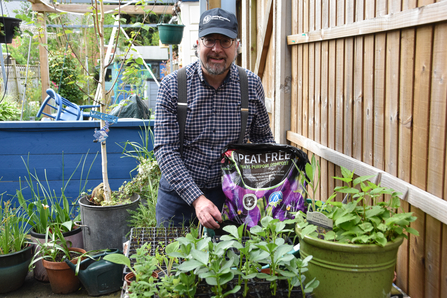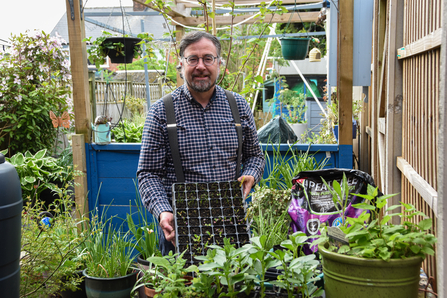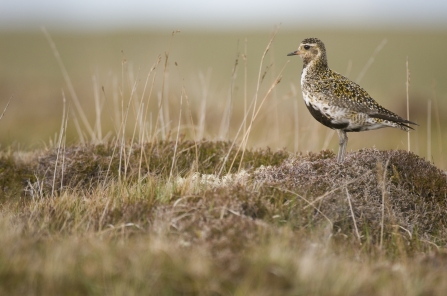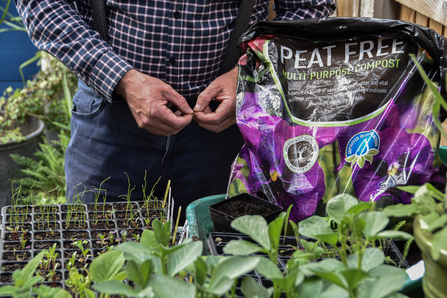
© Sophie Bell
Nature-based solutions to climate change, like healthy peatlands, can make a huge difference for us and wildlife. (Photo by Mark Hamblin / 2020VISION)

© Sophie Bell
As a mad keen gardener, I find this time of year both exciting and frustrating in equal measure. The lighter and warmer days mean that seeds germinate readily – but the risk of a late frost means it can be difficult to find space for the burgeoning number of pots and trays required to give hundreds of young plants the room they need to thrive.
So far this year, I’ve sown dozens of varieties of seeds for the garden and vegetables to grow down at my allotment. These have all been sown in peat free compost – just as I have been doing for well over 20 years.
The fact that many of us have been growing peat free for decades begs the question as to why we’ve had to wait so long for a retail ban on bagged composts containing peat. Years ago, it was a struggle to find peat free compost and in all honesty, early examples were pretty rubbish – but I persevered and I’m glad I did. Now, thanks to greater demand from consumers like me and the looming ban, there is much more choice. I’m currently using three different brands and have no difficulty at all sourcing specialist peat free compost for seedling, tubs and baskets or even acid loving plants such as heathers.

Erin McDaid, Head of Communications, NWT © Sophie Bell
As we’ve seen with the heel dragging over retail composts, voluntary measures are not enough. Huge quantities of peat will continue to be used in the commercial sector meaning that after us home gardeners can no longer buy peat compost, many of the plants we buy will still be grown in peat. This is why I choose to grow most plants from seed or cuttings – I find it hard to stomach the idea that the plants I purchase could be contributing to the destruction of precious peatlands.
Peat is made up of decayed organic matter and vegetation, developing slowly over thousands of years. Peat bogs support a unique ecosystem – being home to all sorts of plants, including colourful sphagnum mosses and insect-eating plants. They support rare dragonflies, spiders and other invertebrates and are a feeding ground for birds, including the golden plover and skylark. Sadly, more than 94% of the UK’s lowland peat bogs have been destroyed or damaged, and a wealth of wildlife has disappeared along with it. This vital habitat isn't easily replaced.

Golden Plover - Photo by Andrew Parkinson / 2020VISION
When the ban on bagged peat by 2024 was announced last year, it was the culmination of a long fight by The Wildlife Trusts and others. The peat free campaign was one of the first I got involved with back in the 1990s. It seems extraordinary that it has taken so long, but delay and dilution are so often the order of the day, as vested interests seek to maximise profits.
Many retailers have gone peat free ahead of the ban and more will follow this year - but the ban doesn’t go nearly far enough. It will only apply to around two-thirds of peat sold in England, so The Wildlife Trusts are calling upon the UK Government to bring forward a total ban on peat extraction and its use in horticulture.

© Sophie Bell
Peatlands are also vital when it comes to climate change - acting like a sponge, absorbing and storing carbon from the atmosphere. Alongside the oceans, peatlands are the second largest store of carbon on the planet. The Wildlife Trusts estimate that peat extraction for horticulture has caused up to 31 million tonnes of CO2 to be released since 1990.
With the gardening year now in full swing, millions of us will be heading to garden centres or ordering plants online. We can push for quicker change by being vocal and asking suppliers to stock peat-free compost and plants now.
Peat belongs to peat bogs and whilst gardeners like me can now enjoy their hobby knowing that their impact on the environment and climate change is much reduced, our choices as consumers are crucial to driving further change. We can make a start by signing The Wildlife Trust’s peat free pledge.
Join the growing movement of gardeners who say NO to peat!